Analyzing Saudi Arabia's Anti-Terrorism Laws within the UN Framework
VerifiedAdded on 2023/06/13
|6
|1581
|483
Essay
AI Summary
This essay examines Saudi Arabia's anti-terrorism laws and their engagement with the United Nations. It highlights Saudi Arabia's efforts in countering terrorism over the past 30 years, including enacting laws, collaborating with international organizations, and establishing counter-terrorism initiatives. The essay discusses the role of the UN in providing a platform for fighting terrorism and the contributions made by Saudi Arabia to the United Nations Counter-Terrorism Center (UNCCT). It also addresses concerns raised by the UN regarding human rights and freedoms in Saudi Arabia, particularly arbitrary arrests and detentions. The essay concludes that while Saudi Arabia has made progress in countering terrorism, challenges remain, including the need for stronger internal policies and strategies and adherence to international human rights laws.
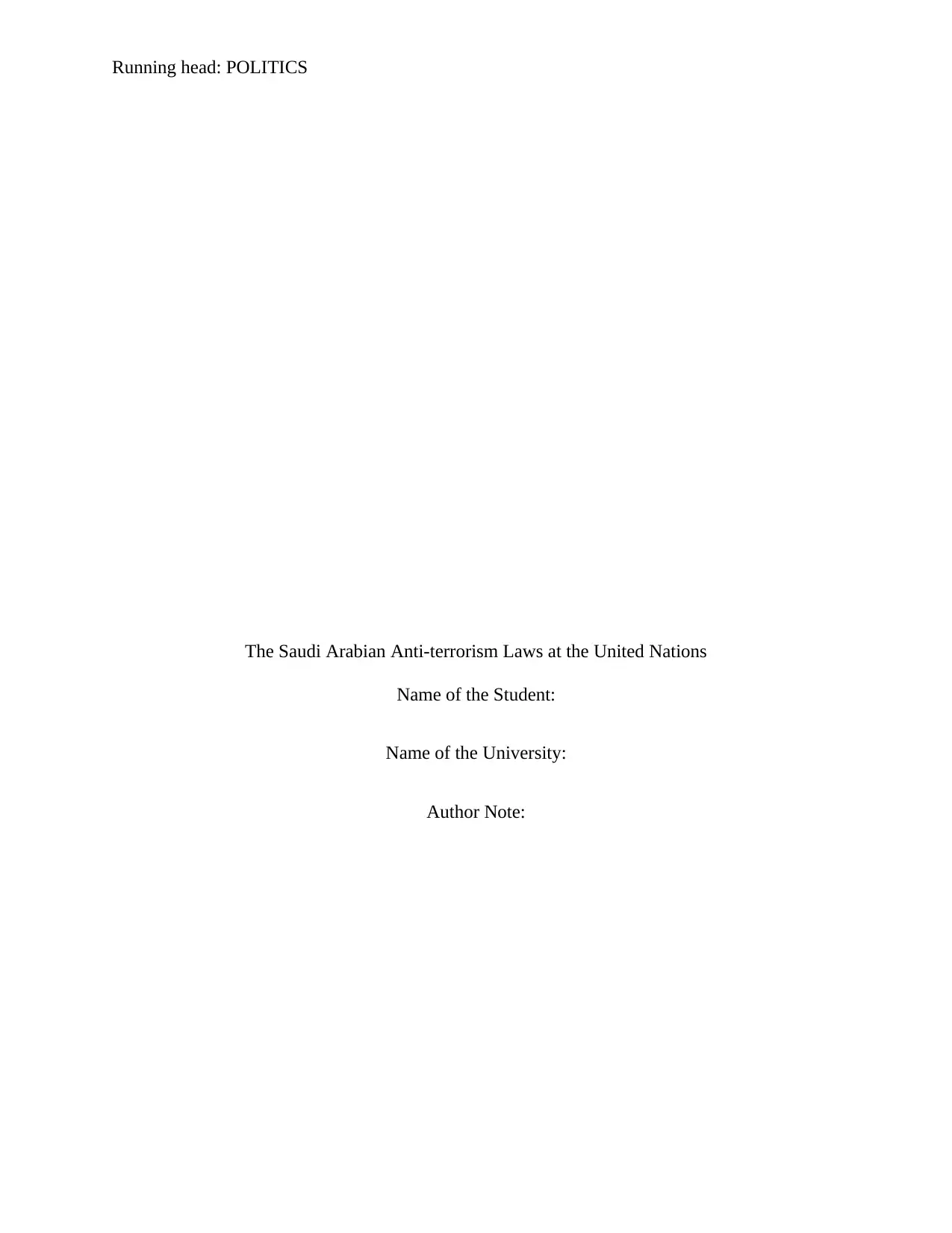
Running head: POLITICS
The Saudi Arabian Anti-terrorism Laws at the United Nations
Name of the Student:
Name of the University:
Author Note:
The Saudi Arabian Anti-terrorism Laws at the United Nations
Name of the Student:
Name of the University:
Author Note:
Paraphrase This Document
Need a fresh take? Get an instant paraphrase of this document with our AI Paraphraser
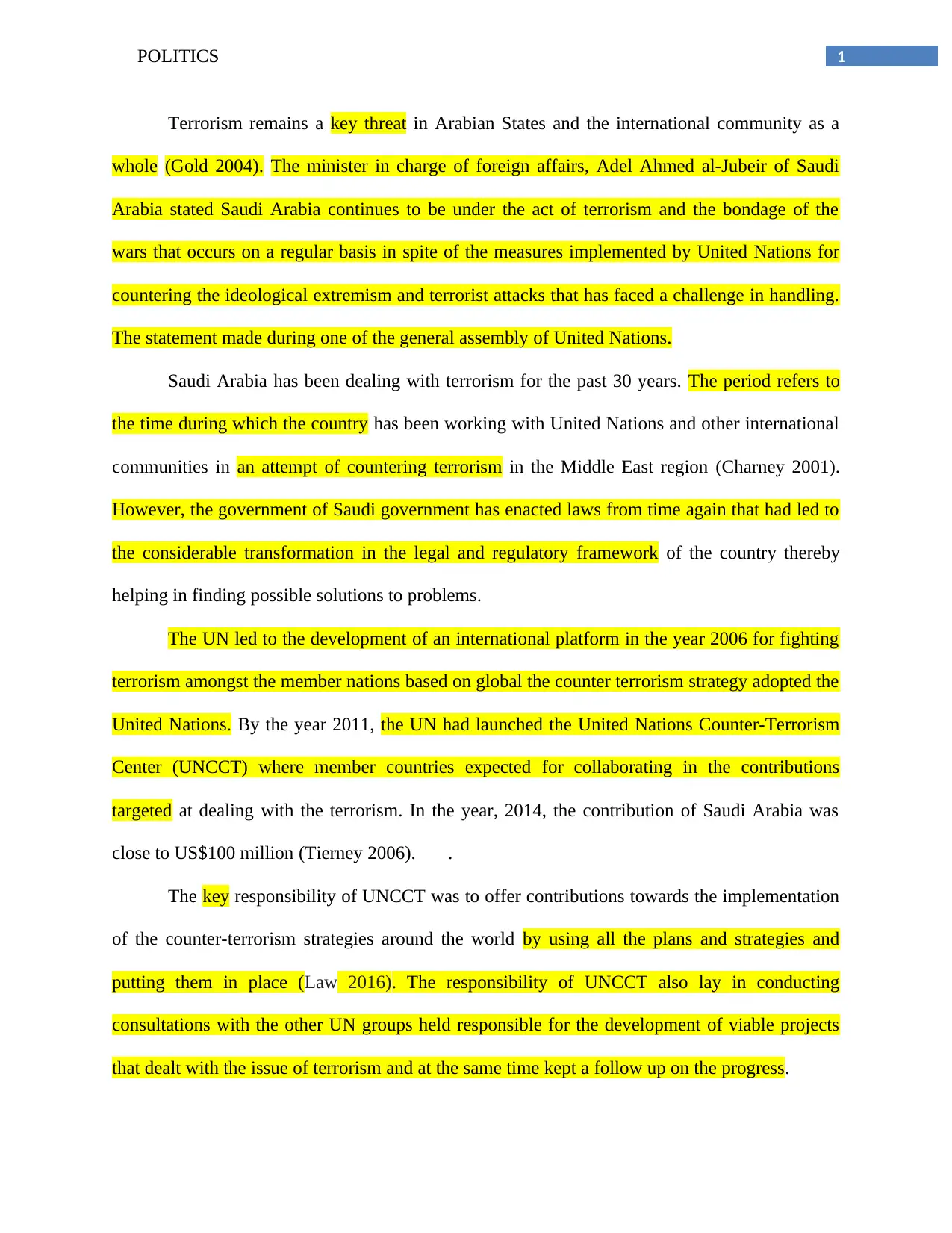
1POLITICS
Terrorism remains a key threat in Arabian States and the international community as a
whole (Gold 2004). The minister in charge of foreign affairs, Adel Ahmed al-Jubeir of Saudi
Arabia stated Saudi Arabia continues to be under the act of terrorism and the bondage of the
wars that occurs on a regular basis in spite of the measures implemented by United Nations for
countering the ideological extremism and terrorist attacks that has faced a challenge in handling.
The statement made during one of the general assembly of United Nations.
Saudi Arabia has been dealing with terrorism for the past 30 years. The period refers to
the time during which the country has been working with United Nations and other international
communities in an attempt of countering terrorism in the Middle East region (Charney 2001).
However, the government of Saudi government has enacted laws from time again that had led to
the considerable transformation in the legal and regulatory framework of the country thereby
helping in finding possible solutions to problems.
The UN led to the development of an international platform in the year 2006 for fighting
terrorism amongst the member nations based on global the counter terrorism strategy adopted the
United Nations. By the year 2011, the UN had launched the United Nations Counter-Terrorism
Center (UNCCT) where member countries expected for collaborating in the contributions
targeted at dealing with the terrorism. In the year, 2014, the contribution of Saudi Arabia was
close to US$100 million (Tierney 2006). .
The key responsibility of UNCCT was to offer contributions towards the implementation
of the counter-terrorism strategies around the world by using all the plans and strategies and
putting them in place (Law 2016). The responsibility of UNCCT also lay in conducting
consultations with the other UN groups held responsible for the development of viable projects
that dealt with the issue of terrorism and at the same time kept a follow up on the progress.
Terrorism remains a key threat in Arabian States and the international community as a
whole (Gold 2004). The minister in charge of foreign affairs, Adel Ahmed al-Jubeir of Saudi
Arabia stated Saudi Arabia continues to be under the act of terrorism and the bondage of the
wars that occurs on a regular basis in spite of the measures implemented by United Nations for
countering the ideological extremism and terrorist attacks that has faced a challenge in handling.
The statement made during one of the general assembly of United Nations.
Saudi Arabia has been dealing with terrorism for the past 30 years. The period refers to
the time during which the country has been working with United Nations and other international
communities in an attempt of countering terrorism in the Middle East region (Charney 2001).
However, the government of Saudi government has enacted laws from time again that had led to
the considerable transformation in the legal and regulatory framework of the country thereby
helping in finding possible solutions to problems.
The UN led to the development of an international platform in the year 2006 for fighting
terrorism amongst the member nations based on global the counter terrorism strategy adopted the
United Nations. By the year 2011, the UN had launched the United Nations Counter-Terrorism
Center (UNCCT) where member countries expected for collaborating in the contributions
targeted at dealing with the terrorism. In the year, 2014, the contribution of Saudi Arabia was
close to US$100 million (Tierney 2006). .
The key responsibility of UNCCT was to offer contributions towards the implementation
of the counter-terrorism strategies around the world by using all the plans and strategies and
putting them in place (Law 2016). The responsibility of UNCCT also lay in conducting
consultations with the other UN groups held responsible for the development of viable projects
that dealt with the issue of terrorism and at the same time kept a follow up on the progress.
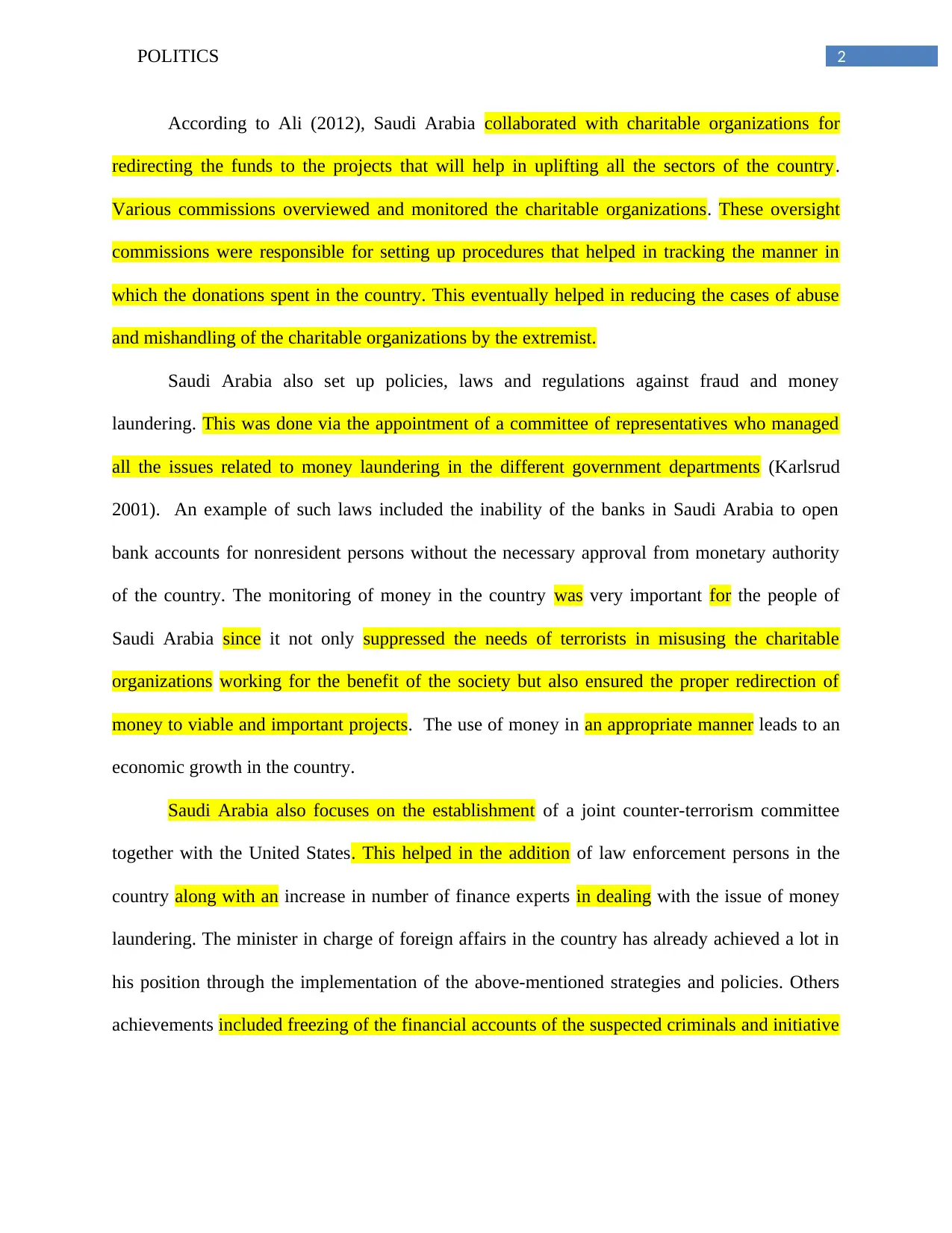
2POLITICS
According to Ali (2012), Saudi Arabia collaborated with charitable organizations for
redirecting the funds to the projects that will help in uplifting all the sectors of the country.
Various commissions overviewed and monitored the charitable organizations. These oversight
commissions were responsible for setting up procedures that helped in tracking the manner in
which the donations spent in the country. This eventually helped in reducing the cases of abuse
and mishandling of the charitable organizations by the extremist.
Saudi Arabia also set up policies, laws and regulations against fraud and money
laundering. This was done via the appointment of a committee of representatives who managed
all the issues related to money laundering in the different government departments (Karlsrud
2001). An example of such laws included the inability of the banks in Saudi Arabia to open
bank accounts for nonresident persons without the necessary approval from monetary authority
of the country. The monitoring of money in the country was very important for the people of
Saudi Arabia since it not only suppressed the needs of terrorists in misusing the charitable
organizations working for the benefit of the society but also ensured the proper redirection of
money to viable and important projects. The use of money in an appropriate manner leads to an
economic growth in the country.
Saudi Arabia also focuses on the establishment of a joint counter-terrorism committee
together with the United States. This helped in the addition of law enforcement persons in the
country along with an increase in number of finance experts in dealing with the issue of money
laundering. The minister in charge of foreign affairs in the country has already achieved a lot in
his position through the implementation of the above-mentioned strategies and policies. Others
achievements included freezing of the financial accounts of the suspected criminals and initiative
According to Ali (2012), Saudi Arabia collaborated with charitable organizations for
redirecting the funds to the projects that will help in uplifting all the sectors of the country.
Various commissions overviewed and monitored the charitable organizations. These oversight
commissions were responsible for setting up procedures that helped in tracking the manner in
which the donations spent in the country. This eventually helped in reducing the cases of abuse
and mishandling of the charitable organizations by the extremist.
Saudi Arabia also set up policies, laws and regulations against fraud and money
laundering. This was done via the appointment of a committee of representatives who managed
all the issues related to money laundering in the different government departments (Karlsrud
2001). An example of such laws included the inability of the banks in Saudi Arabia to open
bank accounts for nonresident persons without the necessary approval from monetary authority
of the country. The monitoring of money in the country was very important for the people of
Saudi Arabia since it not only suppressed the needs of terrorists in misusing the charitable
organizations working for the benefit of the society but also ensured the proper redirection of
money to viable and important projects. The use of money in an appropriate manner leads to an
economic growth in the country.
Saudi Arabia also focuses on the establishment of a joint counter-terrorism committee
together with the United States. This helped in the addition of law enforcement persons in the
country along with an increase in number of finance experts in dealing with the issue of money
laundering. The minister in charge of foreign affairs in the country has already achieved a lot in
his position through the implementation of the above-mentioned strategies and policies. Others
achievements included freezing of the financial accounts of the suspected criminals and initiative
⊘ This is a preview!⊘
Do you want full access?
Subscribe today to unlock all pages.

Trusted by 1+ million students worldwide
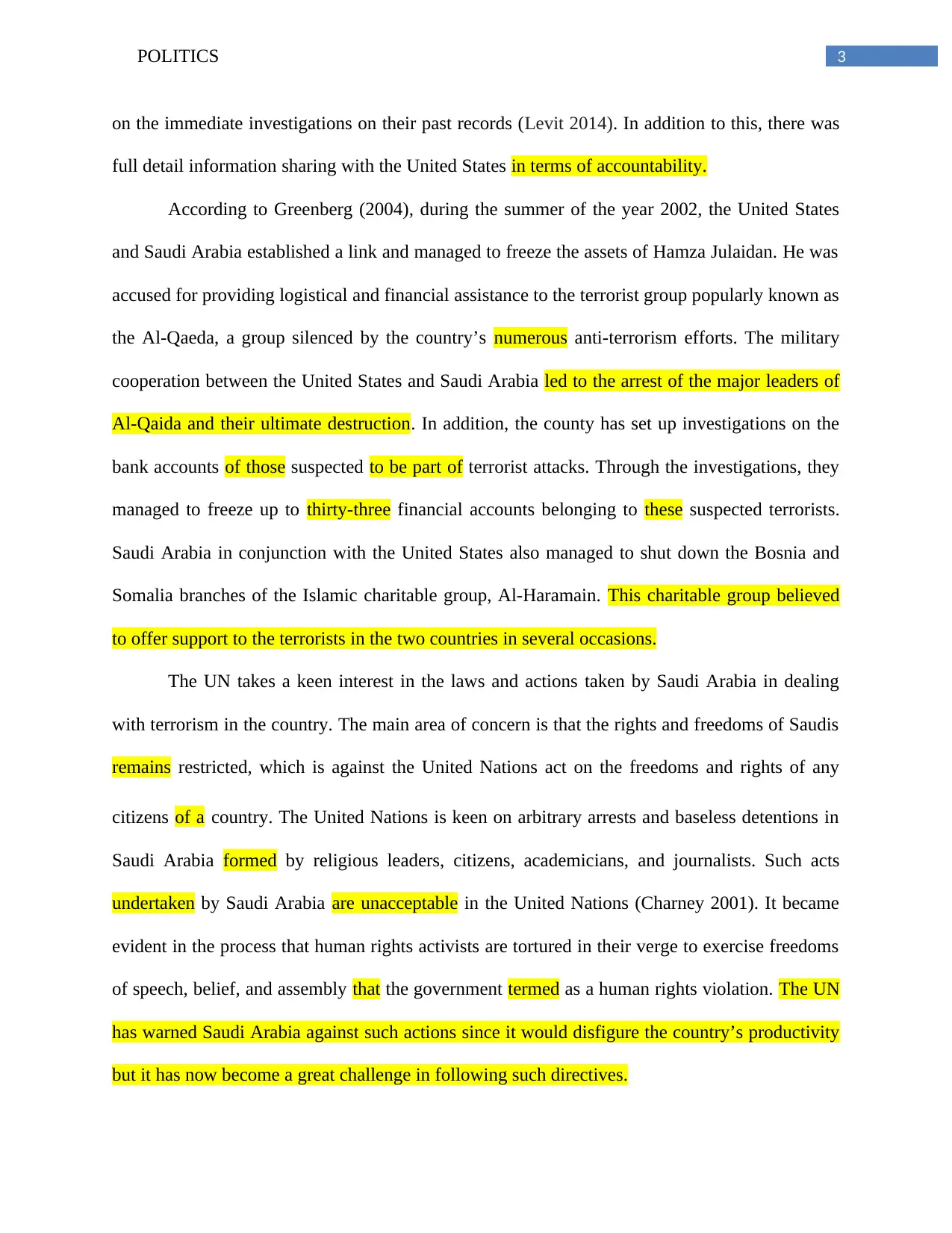
3POLITICS
on the immediate investigations on their past records (Levit 2014). In addition to this, there was
full detail information sharing with the United States in terms of accountability.
According to Greenberg (2004), during the summer of the year 2002, the United States
and Saudi Arabia established a link and managed to freeze the assets of Hamza Julaidan. He was
accused for providing logistical and financial assistance to the terrorist group popularly known as
the Al-Qaeda, a group silenced by the country’s numerous anti-terrorism efforts. The military
cooperation between the United States and Saudi Arabia led to the arrest of the major leaders of
Al-Qaida and their ultimate destruction. In addition, the county has set up investigations on the
bank accounts of those suspected to be part of terrorist attacks. Through the investigations, they
managed to freeze up to thirty-three financial accounts belonging to these suspected terrorists.
Saudi Arabia in conjunction with the United States also managed to shut down the Bosnia and
Somalia branches of the Islamic charitable group, Al-Haramain. This charitable group believed
to offer support to the terrorists in the two countries in several occasions.
The UN takes a keen interest in the laws and actions taken by Saudi Arabia in dealing
with terrorism in the country. The main area of concern is that the rights and freedoms of Saudis
remains restricted, which is against the United Nations act on the freedoms and rights of any
citizens of a country. The United Nations is keen on arbitrary arrests and baseless detentions in
Saudi Arabia formed by religious leaders, citizens, academicians, and journalists. Such acts
undertaken by Saudi Arabia are unacceptable in the United Nations (Charney 2001). It became
evident in the process that human rights activists are tortured in their verge to exercise freedoms
of speech, belief, and assembly that the government termed as a human rights violation. The UN
has warned Saudi Arabia against such actions since it would disfigure the country’s productivity
but it has now become a great challenge in following such directives.
on the immediate investigations on their past records (Levit 2014). In addition to this, there was
full detail information sharing with the United States in terms of accountability.
According to Greenberg (2004), during the summer of the year 2002, the United States
and Saudi Arabia established a link and managed to freeze the assets of Hamza Julaidan. He was
accused for providing logistical and financial assistance to the terrorist group popularly known as
the Al-Qaeda, a group silenced by the country’s numerous anti-terrorism efforts. The military
cooperation between the United States and Saudi Arabia led to the arrest of the major leaders of
Al-Qaida and their ultimate destruction. In addition, the county has set up investigations on the
bank accounts of those suspected to be part of terrorist attacks. Through the investigations, they
managed to freeze up to thirty-three financial accounts belonging to these suspected terrorists.
Saudi Arabia in conjunction with the United States also managed to shut down the Bosnia and
Somalia branches of the Islamic charitable group, Al-Haramain. This charitable group believed
to offer support to the terrorists in the two countries in several occasions.
The UN takes a keen interest in the laws and actions taken by Saudi Arabia in dealing
with terrorism in the country. The main area of concern is that the rights and freedoms of Saudis
remains restricted, which is against the United Nations act on the freedoms and rights of any
citizens of a country. The United Nations is keen on arbitrary arrests and baseless detentions in
Saudi Arabia formed by religious leaders, citizens, academicians, and journalists. Such acts
undertaken by Saudi Arabia are unacceptable in the United Nations (Charney 2001). It became
evident in the process that human rights activists are tortured in their verge to exercise freedoms
of speech, belief, and assembly that the government termed as a human rights violation. The UN
has warned Saudi Arabia against such actions since it would disfigure the country’s productivity
but it has now become a great challenge in following such directives.
Paraphrase This Document
Need a fresh take? Get an instant paraphrase of this document with our AI Paraphraser
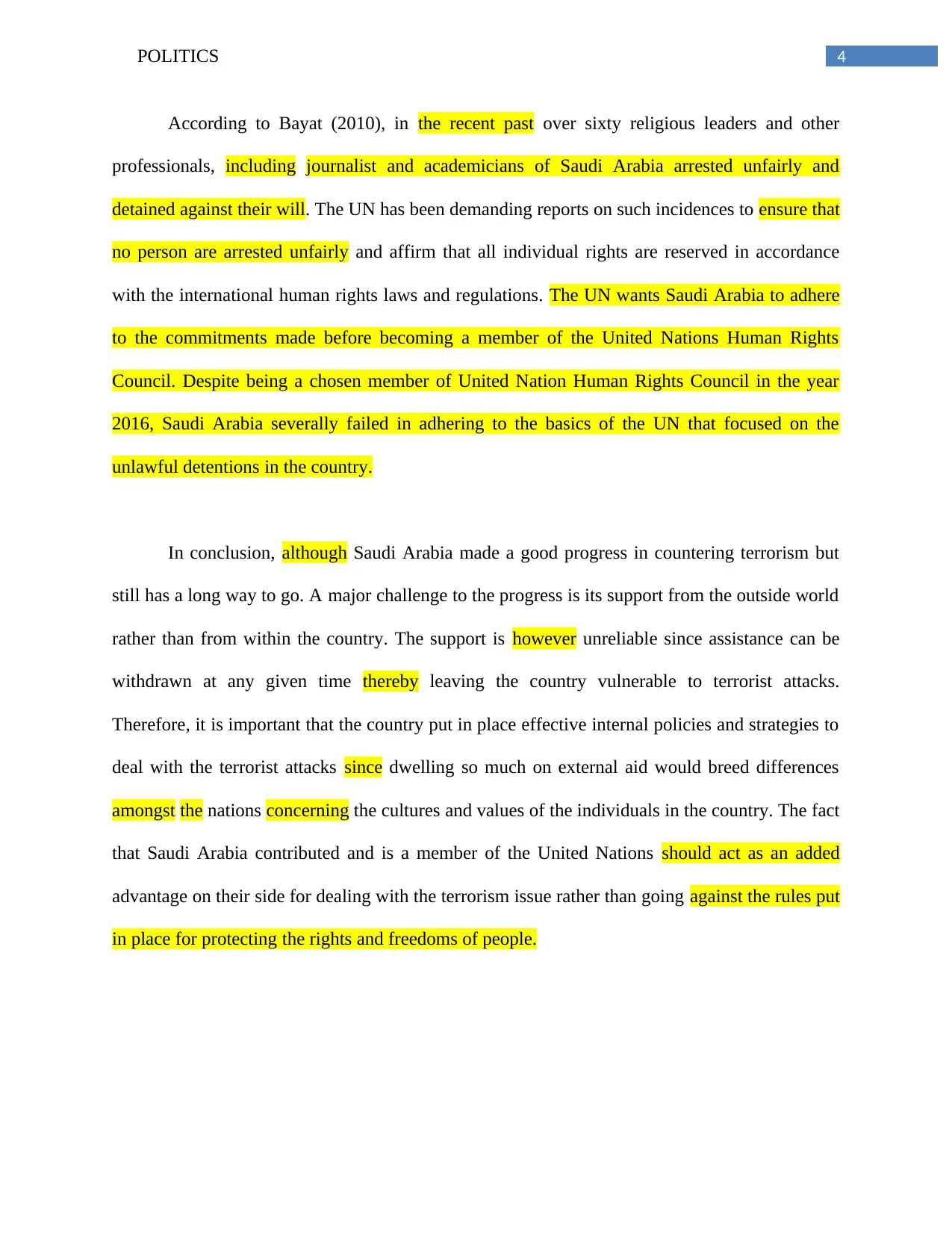
4POLITICS
According to Bayat (2010), in the recent past over sixty religious leaders and other
professionals, including journalist and academicians of Saudi Arabia arrested unfairly and
detained against their will. The UN has been demanding reports on such incidences to ensure that
no person are arrested unfairly and affirm that all individual rights are reserved in accordance
with the international human rights laws and regulations. The UN wants Saudi Arabia to adhere
to the commitments made before becoming a member of the United Nations Human Rights
Council. Despite being a chosen member of United Nation Human Rights Council in the year
2016, Saudi Arabia severally failed in adhering to the basics of the UN that focused on the
unlawful detentions in the country.
In conclusion, although Saudi Arabia made a good progress in countering terrorism but
still has a long way to go. A major challenge to the progress is its support from the outside world
rather than from within the country. The support is however unreliable since assistance can be
withdrawn at any given time thereby leaving the country vulnerable to terrorist attacks.
Therefore, it is important that the country put in place effective internal policies and strategies to
deal with the terrorist attacks since dwelling so much on external aid would breed differences
amongst the nations concerning the cultures and values of the individuals in the country. The fact
that Saudi Arabia contributed and is a member of the United Nations should act as an added
advantage on their side for dealing with the terrorism issue rather than going against the rules put
in place for protecting the rights and freedoms of people.
According to Bayat (2010), in the recent past over sixty religious leaders and other
professionals, including journalist and academicians of Saudi Arabia arrested unfairly and
detained against their will. The UN has been demanding reports on such incidences to ensure that
no person are arrested unfairly and affirm that all individual rights are reserved in accordance
with the international human rights laws and regulations. The UN wants Saudi Arabia to adhere
to the commitments made before becoming a member of the United Nations Human Rights
Council. Despite being a chosen member of United Nation Human Rights Council in the year
2016, Saudi Arabia severally failed in adhering to the basics of the UN that focused on the
unlawful detentions in the country.
In conclusion, although Saudi Arabia made a good progress in countering terrorism but
still has a long way to go. A major challenge to the progress is its support from the outside world
rather than from within the country. The support is however unreliable since assistance can be
withdrawn at any given time thereby leaving the country vulnerable to terrorist attacks.
Therefore, it is important that the country put in place effective internal policies and strategies to
deal with the terrorist attacks since dwelling so much on external aid would breed differences
amongst the nations concerning the cultures and values of the individuals in the country. The fact
that Saudi Arabia contributed and is a member of the United Nations should act as an added
advantage on their side for dealing with the terrorism issue rather than going against the rules put
in place for protecting the rights and freedoms of people.
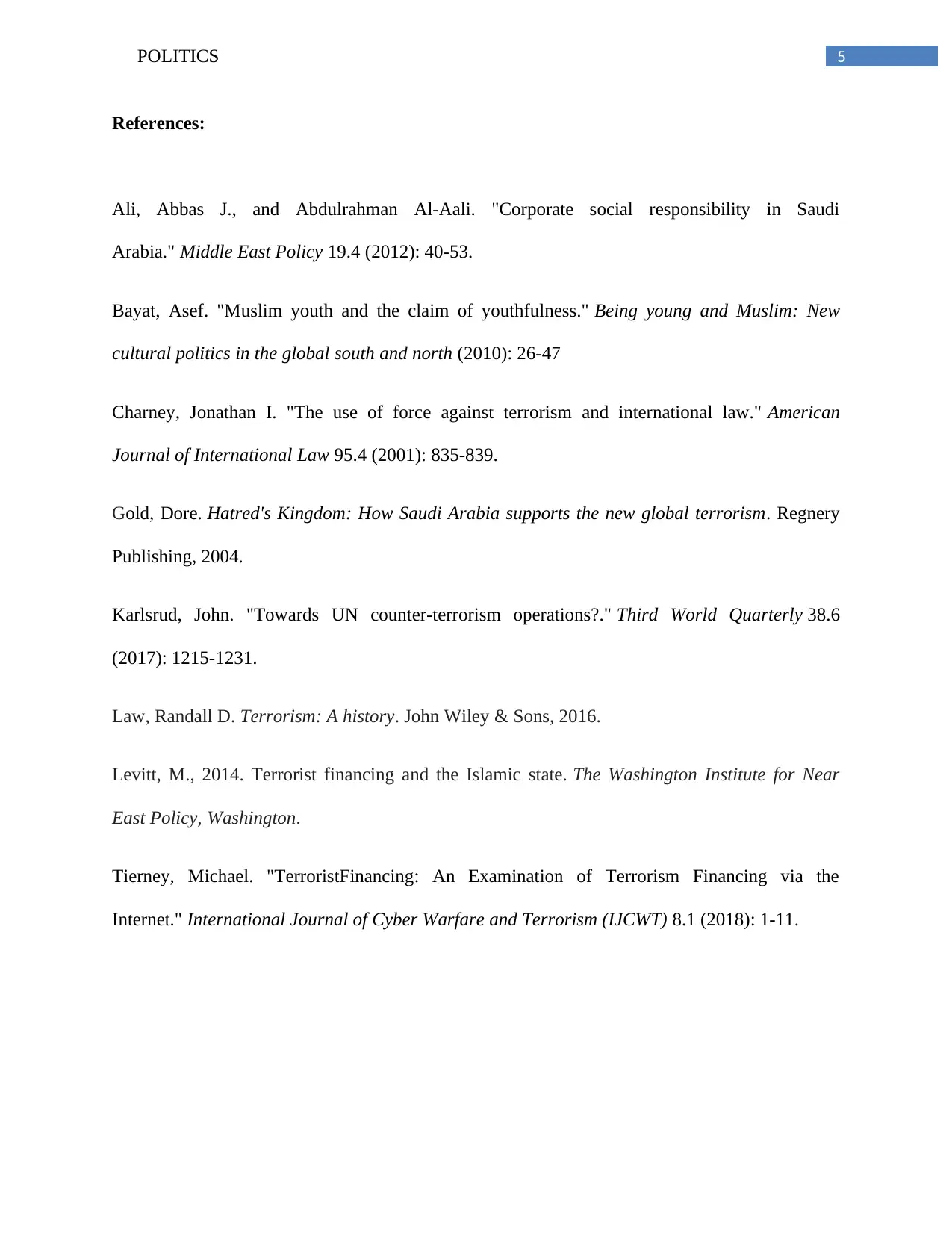
5POLITICS
References:
Ali, Abbas J., and Abdulrahman Al‐Aali. "Corporate social responsibility in Saudi
Arabia." Middle East Policy 19.4 (2012): 40-53.
Bayat, Asef. "Muslim youth and the claim of youthfulness." Being young and Muslim: New
cultural politics in the global south and north (2010): 26-47
Charney, Jonathan I. "The use of force against terrorism and international law." American
Journal of International Law 95.4 (2001): 835-839.
Gold, Dore. Hatred's Kingdom: How Saudi Arabia supports the new global terrorism. Regnery
Publishing, 2004.
Karlsrud, John. "Towards UN counter-terrorism operations?." Third World Quarterly 38.6
(2017): 1215-1231.
Law, Randall D. Terrorism: A history. John Wiley & Sons, 2016.
Levitt, M., 2014. Terrorist financing and the Islamic state. The Washington Institute for Near
East Policy, Washington.
Tierney, Michael. "TerroristFinancing: An Examination of Terrorism Financing via the
Internet." International Journal of Cyber Warfare and Terrorism (IJCWT) 8.1 (2018): 1-11.
References:
Ali, Abbas J., and Abdulrahman Al‐Aali. "Corporate social responsibility in Saudi
Arabia." Middle East Policy 19.4 (2012): 40-53.
Bayat, Asef. "Muslim youth and the claim of youthfulness." Being young and Muslim: New
cultural politics in the global south and north (2010): 26-47
Charney, Jonathan I. "The use of force against terrorism and international law." American
Journal of International Law 95.4 (2001): 835-839.
Gold, Dore. Hatred's Kingdom: How Saudi Arabia supports the new global terrorism. Regnery
Publishing, 2004.
Karlsrud, John. "Towards UN counter-terrorism operations?." Third World Quarterly 38.6
(2017): 1215-1231.
Law, Randall D. Terrorism: A history. John Wiley & Sons, 2016.
Levitt, M., 2014. Terrorist financing and the Islamic state. The Washington Institute for Near
East Policy, Washington.
Tierney, Michael. "TerroristFinancing: An Examination of Terrorism Financing via the
Internet." International Journal of Cyber Warfare and Terrorism (IJCWT) 8.1 (2018): 1-11.
⊘ This is a preview!⊘
Do you want full access?
Subscribe today to unlock all pages.

Trusted by 1+ million students worldwide
1 out of 6
Related Documents
Your All-in-One AI-Powered Toolkit for Academic Success.
+13062052269
info@desklib.com
Available 24*7 on WhatsApp / Email
![[object Object]](/_next/static/media/star-bottom.7253800d.svg)
Unlock your academic potential
Copyright © 2020–2026 A2Z Services. All Rights Reserved. Developed and managed by ZUCOL.





